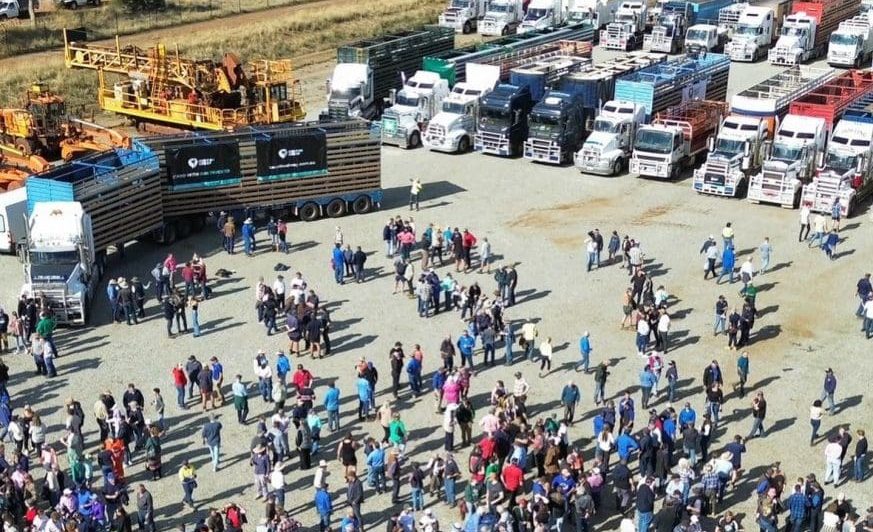INDUSTRY groups have started to put their key issues on the agenda for the upcoming Federal election, with Australians set to head to the polls on Saturday May 3.
The Labor Government’s term has been a tumultuous one for the agricultural industry, with legislation to phase out live sheep exports by sea, large-scale renewable energy development and a series of new climate reporting requirements.
More recently, a proposal to list buffel grass as a weed of national significance has drawn widespread condemnation from the industry. (See yesterday’s story)
Today has been a big focus on live export, with Keep the Sheep campaigners taking to the highways of Perth in their efforts to reverse the phase out of live sheep exports by sea. Keep the Sheep has been running for more than a year and has already held several protests.
The Australian Live Exporters has also been trying to make sure major parties take caution when doing deals with the Teals in the possibility of a hung parliament.
“Farmers in WA and across Australia watched on in dismay in July last year when the Teals not only enthusiastically cheered on Albanes’s live sheep ban, but also during the debate on the bill, many of the Teals also called for live cattle exports to be included too,” chief executive officer Mark Harvey-Sutton said last month.
“Given bans on live exports mostly affects rural and regional areas, and not the Teals’ inner city seats, it should serve as a warning how quickly they are willing to sacrifice the regions that drive Australia’s economy for their desire to remain in Parliament,”
All Teal MPs voted in favour of phasing out live sheep exports and called for live cattle exports to follow, with the exception of WA-based Kate Cheaney who changed her mind at the last minute. Keep the Sheep campaigners have been calling for her to make her position on the industry clear before the election.
Speaking about today’s protests in Perth, Mr Harvey-Sutton said the industry was going to keep fighting.
“Despite the attacks and misrepresentations from the Prime Minister and his Ministers, our industry is standing together. This has only strengthened our resolve,” he said.
Mr Harvey-Sutton said the convoy would serve as a reminder to Perth residents who were busy with jobs and cost of living pressures to remember their rural friends at election time.
“As the election draws near, we’re calling on people to stand with their fellow West Australians who just want to work in their productive businesses, run their IGAs, drive trucks and contribute to the economy.”
“For too long, the Labor party has attempted to dismiss and supress the voices of truckies, shearers, farmers and rural workers.”
NFF calls for policies to ‘secure farming’s future’
In following the election, the National Farmers’ Federation has called for six measures to help the industry into the future.
- Planning for Food Security – Developing a National Food Security Preparedness Strategy
- Cutting Farm Costs – Reducing regulatory burdens and maintaining vital support programs
- Partnering for Sustainability – Investing in practical environmental solutions led by farmers
- Building a Productive Workforce – Addressing critical labour shortages and enhancing safety
- Securing Market Access – Strengthening trade relationships and boosting export competitiveness
- Investing in the Regions – Fixing unsafe rural roads and delivering on regional housing and childcare
“Australian agriculture stands at the intersection of major global trends that will reshape farming and food prices,” chair David Jochinke said.
“From rising input costs to climate pressures, our $80 billion export industry faces unprecedented challenges.
“But with the right policies, we can turn these challenges into opportunities – keeping food affordable while growing towards our goal of becoming a $100 billion industry by 2030.”
Tariffs on agenda
Federal Nationals Leader David Littleproud stopped off at Toowoomba show yesterday, where he was asked about the coalition’s approach to Trump tariffs in the leadup to the election.
What makes Peter Dutton think he can stop Trump’s tariffs? journalists asked.
“Tariffs are inflationary,” Mr Littleproud said.
“The rules-based order of trade has served Australia and has served the United States well. What you’ve got to do is be able to get respect from President Trump and unfortunately, we’ve got a Prime Minister, and we’ve got an Ambassador in Washington that have made very disparaging comments about the President.”
“There’s no way in the world that the President hasn’t been advised about what Anthony Albanese has said about him in the past, or what Kevin Rudd has said about him in the past. When he can’t even get a phone to be picked up, let alone get in the front door of the White House, when Australia is literally going out the back door, you would have thought that we need better leadership here,” Mr Littleproud said.
“Where President Trump smells weakness, you need to be prepared to look him in the eye and stand up to him, as we did. Peter Dutton stood up to President Trump when he made those comments about Vladimir Putin not starting the Ukrainian war. I think that gets more respect than somebody that doesn’t have the respect to actually be able get a phone call.”
“That’s what Peter Dutton has because he dealt, as have I, with the previous Trump administration, as well as the Biden administration and I the think the Obama administration before that in Peter Dutton’s case. So, he has connections in the United States, but we’ve got to have the right personnel that have the respect of the US on the ground. It shouldn’t be team Australia. It’s important, but if we do get carve outs, leverage our position to return the United States to a rules-based order, because that has served us and the world well.”


Luke warm on one of the NFF measures, but otherwise a very good report. Well done. May it be widely read.